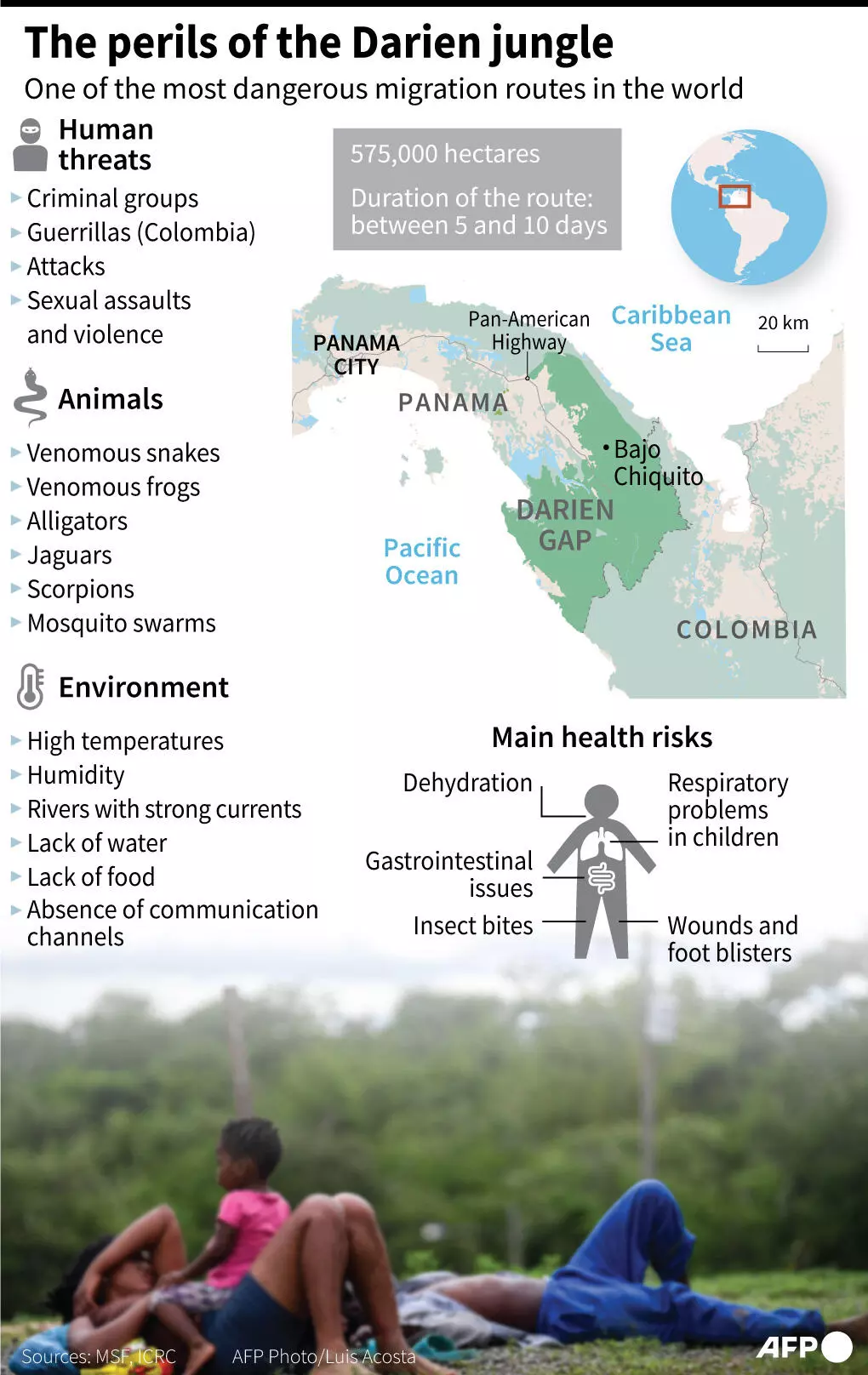The corner of Costa Rica where people live on, and on
Issued on: 29/09/2021 -

Saturnino Lopez, 94, stands next to a pile of firewood at his home in Nicoya, Costa Rica, on August 27, 2021
Ezequiel BECERRA AFP
Dulce Nombre (Costa Rica) (AFP)
Aged 94, Saturnino "Sato" Lopez rises early each day, chops wood and takes long walks in a part of Costa Rica that's a global oddity: like him, people there tend to live a very long time.
Home for Sato is the Nicoya Peninsula, where 1,010 people aged 90 or older live in a so-called "Blue Zone" -- five areas around the world where life expectancy is particularly high.
And these people did not move to the peninsula, located in the northwest of Costa Rica. Rather, they have always lived there.
"At my age, I feel well because the Lord gives me strength to walk at ease. I go out, walk maybe a kilometer (around half a mile), or four kilometers, and I return, no problem," said Lopez.
His house in a village called Dulce Nombre -- Sweet Name -- is a sort of nature refuge.
The village's wood, concrete and stick-and-mud houses are surrounded by vegetation and cicadas drone non-stop. The Covid-19 pandemic has gone easy on this village.
"During the day if I have to sweep the patio, I sweep. If I have to chop wood, I chop, also. A bit of everything," said Lopez.
- Blue Zones -
In the late 20th century, demographer Michel Poulain and a physician named Gianni Pes used a blue marker to highlight on a map the Barbalia region of Sardinia, Italy, where they found people lived a very long time.
In 2005, an American author and National Geographic fellow named Dan Buettner discovered similar characteristics in Loma Linda, California; Ikaria, Greece; Okinawa, Japan, and Nicoya.
So what is their secret?
"The main food is rice and beans. A bit of meat, fruit, avocado. That is what you eat. They say this is good food," said Lopez.
His neighbors Clementina Espinoza, 91, and her husband Agustin, 100, follow a similar diet.
Espinoza has outlived six of her 18 children. She walks slowly but steadily, and still tosses corn to her chickens, prepares meals and washes up afterward.

Clementina Espinoza, 91, tends to her garden in Nicoya
Ezequiel BECERRA AFP
She exhibits robust energy in a country where the life expectancy is a mere 80. For the world in general it is 72, the World Health Organization says.
"Out in the countryside, life is quieter," said Espinoza, insisting that diet is key. "You are more relaxed and there is not so much danger."
- Having purpose is key -
Having goals is critical to aging well, said Aleyda Obando, who works in the social security administration in Nicoya.
"They thank God for being alive and they make plans, to plant something or go see friends," said Obando. "It is a combination of factors that makes these people last longer."
It also helps to have a social support network, exercise, eat healthy food and minimize stress.
"We grew corn, rice, beans, everything. We grew what we ate," said Clementina. Now, her daughter Maria looks after her.
Agustin, one of 53 people in the area who are 100 or older, is blind now and suffered a stroke. Still, you can tell he likes it when Clementina caresses him.
- Back in the saddle -
Jose Villegas is another centenarian, who lives in the neighboring village of San Juan de Quebrada Honda, with one of his eight daughters.
He is hoping that when he turns 105 on May 4 he can once again ride a horse -- he used to make his living on horseback, herding livestock. But sometimes he has trouble with his legs.
Being 104, he says, "is a big deal because God has given me a lot of life. It was not fantastic but it was not bad, either," said Villegas, sitting in the house he was born in.
"Now, lifestyles have changed. It is not the same as before. Things used to be healthier and people loved each other a little bit more," said Villegas, who became a widower seven years ago and spends his evenings listening to folk music.
Gilbert Brenes, a demographer at the University of Costa Rica, said the Blue Zone's elderly population may peak in the next 20 or 30 years and then decline.
Younger generations have different diets and suffer more from diseases like obesity and diabetes. And fewer and fewer people grow what they eat.
But Saturnino Lopez, a father of nine, remains active.
"My children say to me, 'you no longer work. We have to work to support you.' But I don't like that, because I know what keeps me going," he said, referring to physical activity like cutting wood.
"Even if it is just a couple of blows with the machete, that's enough."
© 2021 AFP
Want to live forever? Theoretically, you could, study says
Issued on: 29/09/2021 -

Kane Tanaka is currently the oldest living person in the world, at 118
JIJI PRESS JIJI PRESS/AFP/File
Tokyo (AFP)
Humans can probably live to at least 130, and possibly well beyond, though the chances of reaching such super old age remain vanishingly small, according to new research.
The outer limit of the human lifespan has long been hotly debated, with recent studies making the case we could live up to 150 years, or arguing that there is no maximum theoretical age for humans.
The new research, published Wednesday in the Royal Society Open Science journal, wades into the debate by analysing new data on supercentenarians -- people aged 110 or more -- and semi-supercentenarians, aged 105 or more
While the risk of death generally increases throughout our lifetime, the researchers' analysis shows that risk eventually plateaus and remains constant at approximately 50-50.
"Beyond age 110 one can think of living another year as being almost like flipping a fair coin," said Anthony Davison, a professor of statistics at the Swiss Federal Institute of Technology in Lausanne (EPFL), who led the research.
"If it comes up heads, then you live to your next birthday, and if not, then you will die at some point within the next year," he told AFP.
Based on the data available so far, it seems likely that humans can live until at least 130, but extrapolating from the findings "would imply that there is no limit to the human lifespan," the research concludes.
The conclusions match similar statistical analyses done on datasets of the very elderly.
"But this study strengthens those conclusions and makes them more precise because more data are now available," Davison said.
The first dataset the team studied is newly released material from the International Database on Longevity, which covers more than 1,100 supercentenarians from 13 countries.
The second is from Italy on every person who was at least 105 between January 2009 and December 2015.
- 'One in a million' -
The work involves extrapolating from existing data, but Davison said that was a logical approach.
"Any study of extreme old age, whether statistical or biological, will involve extrapolation," he said.
"We were able to show that if a limit below 130 years exists, we should have been able to detect it by now using the data now available," he added.
Still, just because humans can theoretically reach 130 or beyond, doesn't mean we're likely to see it anytime soon.
For a start, the analysis is based on people who have already achieved the relatively rare feat of making it to well over 100.
And even at age 110, your chances of making it to 130 are "about one in a million... not impossible but very unlikely," said Davison.
He thinks we could see people reaching 130 within the century, as more people make it to supercentenarian status, increasing the chances of one becoming that one in a million.
"But in the absence of major medical and social advances, ages much over this are highly unlikely ever to be observed," he added.
For now, the oldest person on record is Frenchwoman Jeanne Calment, who died in 1997 at the confirmed age of 122.
Her true age was the subject of some controversy, with claims of a possible fraud, but in 2019 several experts said a review of the evidence confirmed her age.
Other pretenders to the throne of oldest person ever have a long way to go. The oldest verified living person in the world is Japan's Kane Tanaka, a comparatively youthful 118.
© 2021 AFP

























